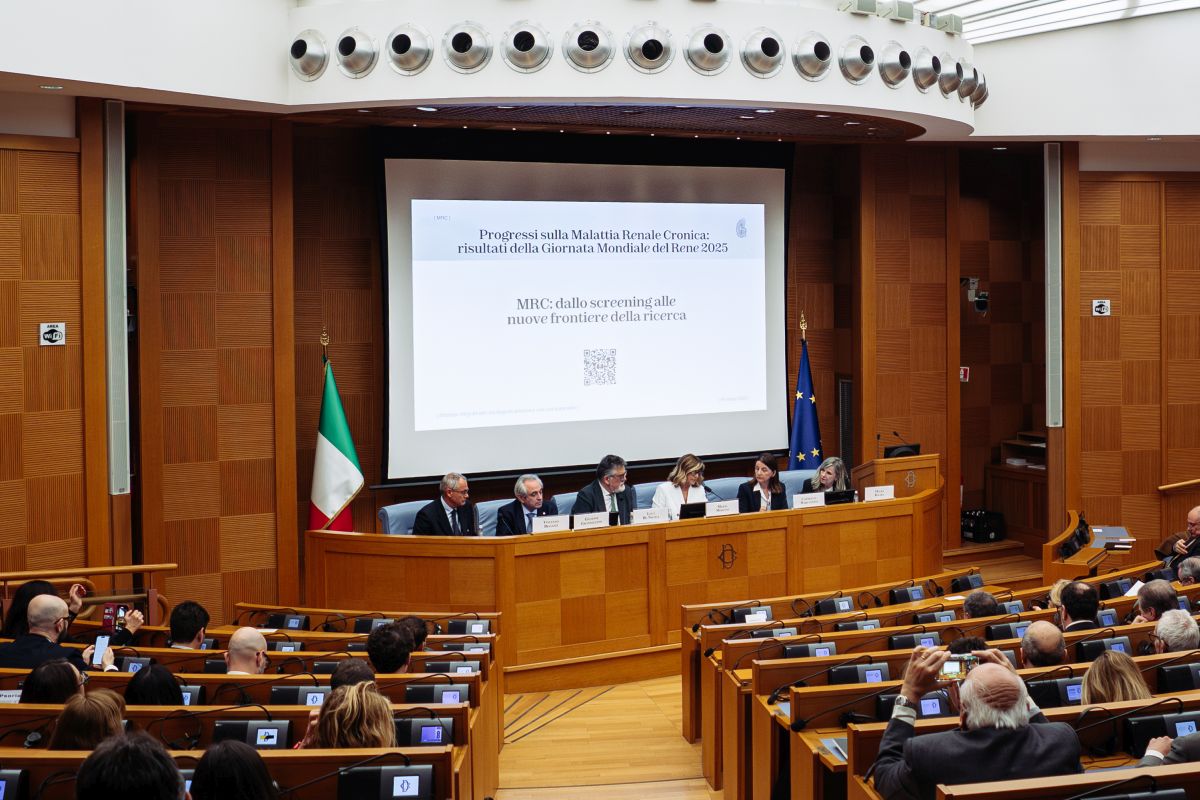ROME (ITALPRESS) – The event “Progress on Chronic Kidney Disease: Results of World Kidney Day 2025″, sponsored under the patronage of the Italian Kidney Foundation and the Italian Society of Nephrology, with the aim of presenting the policy paper on Chronic Kidney Disease, drafted by the Multistakeholder Working Group and realized with the nonconditional contribution of AstraZeneca, Bayer Italy, Boehringer Ingelheim, Otsuka Pharmaceutical Italy, Novartis Italy, Dr Schàr, CSL Vifor, Amgen Italy and Astellas Pharma.
“Chronic Kidney Disease is a silent disease that affects more than 10 percent of the adult population, with a significant health and economic impact,” said Giorgio Mulè, vice president of the Chamber of Deputies.
“The Bill,” Mulè continues, “currently hinged in the 12th Commission and whose analysis is beginning, aimed at establishing a national screening program, represents a strategic intervention to encourage early diagnosis and counter the progression of the disease to advanced stages. Indeed, the initiative has immediately met with favor from the scientific society and patient associations, whom I thank for their contribution. Now a joint effort is essential to ensure a rapid and effective legislative process, so that the Bill can be translated, within the year, into a concrete reform that clinicians, patients and the private sector have been waiting for.”
The urgency of a measure was reiterated by Annarita Patriarca, secretary of the Presidency and second signatory of the DdL: “The speedy approval of the Bill is a priority goal. A structured screening program allows early detection of the disease, reducing complications and costs for the National Health Service. What has emerged from the presentation of the document,” Patriarca continues, “is a fundamental contribution to consolidate the framework of scientific evidence and suggest strategic indications to the public decision maker to define effective and sustainable measures.
During the event, the need for simplification of treatment plans and a synergistic approach between community medicine and nephrology specialists was emphasized to ensure equitable access to diagnostic and treatment pathways. Luca De Nicola, President of the Italian Society of Nephrology, highlighted “as explained extensively in the document we are presenting today, the current system of Therapeutic Plans is an obstacle for patients and a burden for clinicians. It is essential to adopt more streamlined tools that ensure greater therapeutic adherence and reduce the administrative burden for specialists and General Practitioners.”
“The Bill,” De Nicola continues, “represents a concrete opportunity to establish a structured pathway on a national scale, which is why we have worked intensively with the entire Multistakeholder Working Group, which includes the scientific society I represent, patient associations and companies.
Another central theme is the role played in the early diagnosis and management of Chronic Kidney Disease by General Practitioners, the first point of reference for the patient and the link with nephrology specialists. Gaetano Piccinocchi, Treasurer of the Italian Society of General Medicine and Primary Care, stressed that “the collaboration between General Practitioner and nephrology specialist is a fundamental pillar to ensure continuity of care and appropriate therapeutic pathways. In addition,” Piccinocchi continued, “we are actively working to launch pilot screening programs, carried out in synergy with the Italian Society of Nephrology.
The discussion also revealed the need for a more homogeneous model of care at the national level. Giuseppe Vanacore, president of the National Association of Hemodialysis Dialysis and Transplantation, reiterated that “ensuring equity in access to treatment and improving care pathways must be a priority. The quality of life of nephropathy patients depends on the ability to ensure integrated care that overcomes regional inequalities.”
“The document presented today,” Vanacore continued, “provides a detailed picture of the main critical issues that patients face on a daily basis, highlighting the areas of intervention needed for more effective and uniform care. The event confirmed the urgency of a structured regulatory intervention to address the critical issues related to Chronic Kidney Disease. Collaboration between institutions, the scientific community, and patient associations will be crucial to translate the proposals that emerged into concrete measures, with the aim of improving the management of the disease and strengthening the sustainability of the National Health Service.
-photo press office Esperia Advocacy.
(ITALPRESS).

